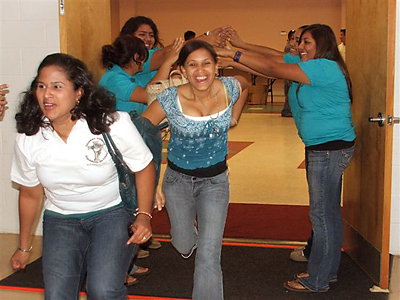
 COLUMBIA — Some 125 teens and young adults from six states gathered at Our Lady of the Hills Church family life center Sept. 12-13 for a lively Hispanic youth ministry workshop.
COLUMBIA — Some 125 teens and young adults from six states gathered at Our Lady of the Hills Church family life center Sept. 12-13 for a lively Hispanic youth ministry workshop.
The workshop is one of three scheduled for the preparation of “Pascua Juvenil,” or “Easter for Youth,” sponsored by the Southeastern Pastoral Institute in Miami.
“The Pascua Juvenil is the study and conversion process developed by young Hispanics for young Hispanic persons to reflect the paschal mystery of our faith through a particular topic,” according to Rey Malave, coordinator of Hispanic Youth and Young Adult Ministry in the Diocese of Orlando, Fla., and one of the organizers.
“The process reviews and analyses the topic as to the negative affect it may have on young people and how through the process of dying and then resurrection, they can live with and in Christ.”
In the first workshop, youths discuss and study topics that will be used to create a book in the subsequent gatherings. Each diocesan group will author a chapter, which includes reflection, prayers, activities, projects, Scripture, church documents, poems, and songs to help the users understand the subtopic. The books are edited by SEPI and then used by youth and young adult leaders during Lent as reflections on the subject and the paschal mystery.
Each workshop is hosted by a different diocese. This year’s theme focused on the human body and a wide variety of topics on sexuality. While the workshops pinpointed serious issues, the crowd at Our Lady of the Hills was anything but somber.
As new groups arrived, they were greeted before they even slid out of their cars by exuberant youth wearing blue T-shirts and shouting spirited welcomes. When they entered the family life center they rushed under a bridge of clasped hands formed by another group chanting greetings.
One of the greeters, originally from Mexico who now lives in Lexington, said she enjoyed the camaraderie of the ministry. “I want to be involved,” she said.
Before the program began some young musicians played music and sang songs that prompted spontaneous line dances, hand-waving and clapping from the audience.
The visitors were also welcomed by Father D. Anthony Droze, pastor of Our Lady of the Hills. “It is a blessing for us for you to be here,” Father Droze said. “We pray that as your faith explores, you will befriend it.”
The priest, a native of Charleston, expressed the hope that “as you learn the English language it will have a Southern accent.”
Rhina Medina, the junior associate director of Hispanic youth ministry for the Diocese of Charleston, said the most moving thing she observed during the program was the poignant depictions the young delegates presented of the Stations of the Cross.
The workshop approach was adopted by Catholic Church leaders in the United States after a visit to the Dominican Republic, where the program received strong attention. The missionaries were unable to meet with local Catholics “because they were all too busy participating in the program,” Malave said.
Attendants at the Columbia gathering were a mix of newcomers and long-time American residents whose interests range from English language problems to basic religion issues.
Malave said he spoke with one youth who was disturbed because he could not say his prayers in English.
The small books written from past meetings were spread out on a table. They included modern issues such as immigration and drugs, but also delved into the traditional teachings of the church, such as reconciliation and absolution.
Topics often came from world headlines, but they included discussions on the values Christ has taught. As the participants meet in workshops to discuss the issues, Malave said they learn more about Christian values and the art of research.
Organizers said some of the youth attending this workshop could emerge as future leaders in the Catholic community as the Hispanic population continues to increase.
The participants came from 14 dioceses, many staying with families in local parishes that volunteered to host them for the weekend.
